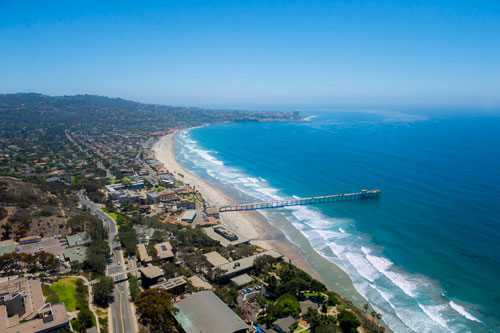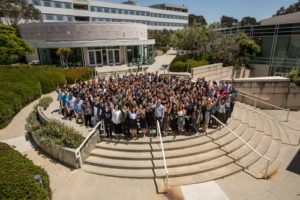Leaders in Higher Education
THIS GUIDE IS NO LONGER ACTIVE. For the current FP Guide, click here.
KATE RICKE, Assistant Professor
UC San Diego, School of Global Policy and Strategy
The ongoing political debate over whether climate change is real or not doesn’t perturb climate change scientist Kate Ricke, assistant professor at the School of Global Policy and Strategy (GPS) at UC San Diego.
“It’s nothing new. It’s a little more extreme in the U.S. lately, but there’s always been this debate in the political world about climate change’s legitimacy and its economic impact,” she says.

“At GPS, we’re working on quantifying climate change impacts and trying to project how health, productivity, and the economy may be affected in bigger ways in the future.” –Kate Ricke, Assistant Professor, School of Global Policy and Strategy, UC San Diego
Despite the controversy, climate research continues, she notes. “Around the world, environmental policies are being put in place to change the way we do things. Climate change is not going to go away.”
In fact, the intersection of science and public policy is the hallmark of GPS’s program and the reason Ricke joined the faculty a year ago, where she holds a joint appointment with GPS and the nearby Scripps Institution of Oceanography.
 “In just the year I’ve been here, I’ve seen a hugely expanding interdisciplinary program bringing together science, technology, engineering, and public policy,” says Ricke. “There’s a wave of investment in international climate policy. There’s a new center at GPS and faculty working specifically on climate change and adaptation. Students also have opportunities to learn more about engineering and to take courses at Scripps to learn about climate and marine science and preservation of marine ecosystems. It’s very exciting.”
“In just the year I’ve been here, I’ve seen a hugely expanding interdisciplinary program bringing together science, technology, engineering, and public policy,” says Ricke. “There’s a wave of investment in international climate policy. There’s a new center at GPS and faculty working specifically on climate change and adaptation. Students also have opportunities to learn more about engineering and to take courses at Scripps to learn about climate and marine science and preservation of marine ecosystems. It’s very exciting.”
GPS has long been known for its strong quantitative component, she notes. “Students have to take a rigorous string of classes that require them to learn intense quantitative skills. That’s what students come to us for, along with the school’s strong focus on the Americas and Asia,” Ricke says.
Ricke, who got her undergraduate degree in earth, atmospheric and planetary science at the Massachusetts Institute of Technology and holds a PhD in engineering and public policy from Cornell University, says public policy decisions in today’s world demand a strong understanding of science and technological innovation: “It’s crucial for being able to work all sides of a problem effectively.”
 She has done research examining how extreme weather events, such as the recent hurricanes, might change the way people think about and support environmental policies. “These events may make things more salient to people, but there’s still the question of how long it takes us to decide how to best protect ourselves against future crises.”
She has done research examining how extreme weather events, such as the recent hurricanes, might change the way people think about and support environmental policies. “These events may make things more salient to people, but there’s still the question of how long it takes us to decide how to best protect ourselves against future crises.”
Efforts to quantify the economic and health effects of climate disasters to help people understand impacts of climate change—for example, the amount of revenue lost, the increase in medical costs—is the focus of the class in policy analysis and decision theory that Ricke teaches in the school’s new Master of Public Policy program (MPP).
“At GPS, we’re working on quantifying climate change impacts and trying to project how health, productivity, and the economy may be affected in bigger ways in the future. And that’s the challenge, because there’s no perfect way to do that.”
Graduate Degree Program Options:
• Master of International Affairs (MIA)
• Master of Public Policy (MPP)
• Master of Chinese Economic and Political Affairs (MCEPA)
• Master of Advanced Studies in International Affairs (MAS-IA, mid-career)
• PhD in Political Science and International Affairs
Visit the Request Info page to receive information from the schools.
Contents
- Leaders in Higher Education
- Johns Hopkins School of Advanced International Studies (SAIS)
- Georgetown University, Walsh School of Foreign Service
- Stanford University, Freeman Spogli Institute for International Studies
- Texas A&M University, Bush School of Government and Public Service
- New York University School of Professional Studies, Center for Global Affairs
- UC San Diego, School of Global Policy and Strategy
- University of Denver, Josef Korbel School of International Studies
- University of Washington, Henry M. Jackson School of International Studies
- Arizona State University, Center on the Future of War
- Georgetown University School of Continuing Studies
- Syracuse University, Maxwell School of Citizenship and Public Affairs; and Center for Strategic and International Studies
- University of Kent, Brussels School of International Studies
- Sciences Po, Paris School of International Affairs
- Columbia University, School of International and Public Affairs (SIPA)
- The Fletcher School of Law and Diplomacy at Tufts University
- University of Notre Dame, Keough School of Global Affairs
- Arizona State University, Thunderbird School of Global Management